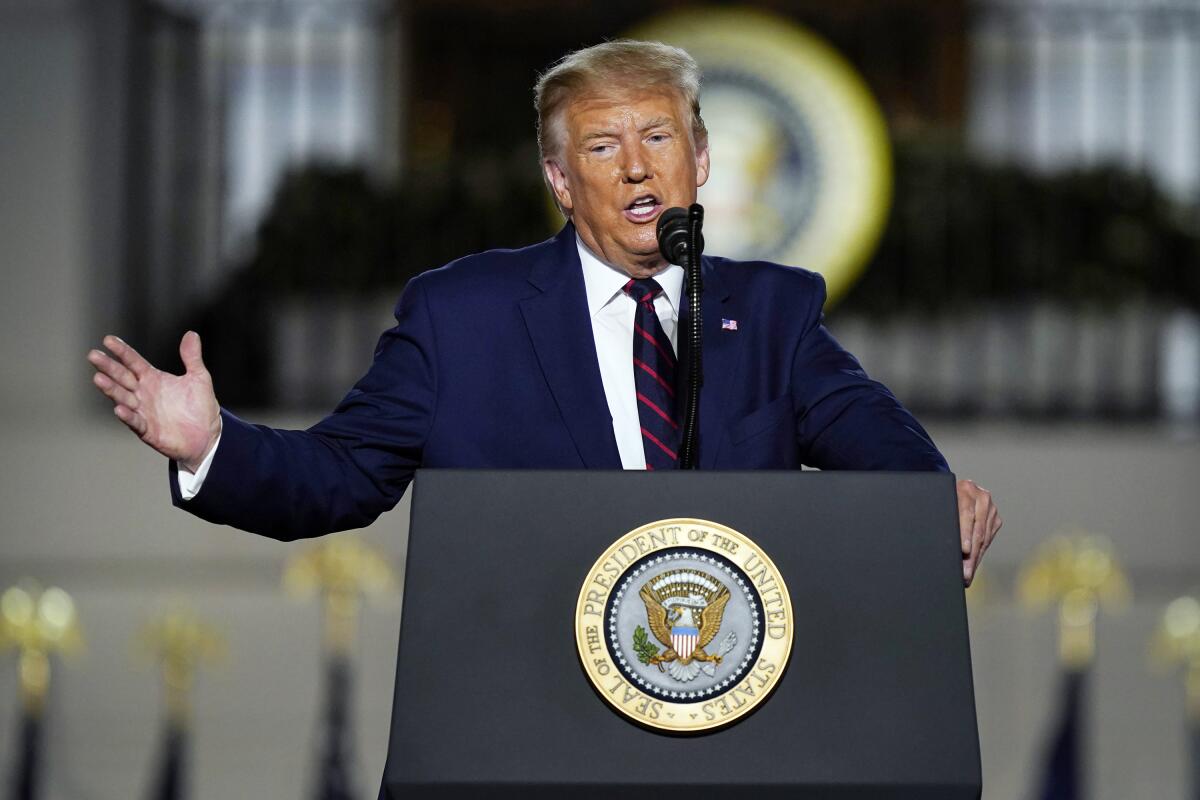Opinion: Trump’s second-term agenda: New and authoritarian ways to own the libs

In his acceptance speech Thursday night, President Trump finally laid out a clear to-do list for his second term. It’s notable for both its disparagement of government power and its aggressive use of said power, the same sort of clash between libertarian and authoritarian impulses that has characterized the president’s first term.
Trump laid out roughly three dozen specific goals in Thursday’s speech, most of them quantifiable and measurable. The bulk of them came out in rapid-fire fashion late in the speech, after Trump had catalogued at length the miseries that would ensue if Joe Biden were elected president. They included actions that he promised the federal government would take and developments he promised it would prevent.
On the economic front, he promised to “create 10 million jobs in the next 10 months,” which would cut unemployment by about 40%. (There are about 25 million people receiving unemployment benefits by the U.S. Department of Labor’s count.) He didn’t offer much detail on how he’d do that, other than to say he “will continue to reduce taxes and regulations at levels not seen before” and that he would expand tax breaks for investment in poor communities (“Opportunity Zones”).
Those are classic Republican small-government moves right there. But Trump also tossed in some industrial policy, promising to “bring home our medical supply chains,” end reliance on Chinese manufacturers, “expand energy development” and “win the race to 5G” wireless networks. The U.S. will also win the race to Mars and be the first country to land a woman on the moon, Trump pledged.
His real love of federal power, though, shone through when discussing his law-and-order and social agendas. Beyond providing money for more cops, Trump promised to “surge federal prosecutors into high-crime communities” and toughen federal penalties for assaults on police. The feds will “ban deadly sanctuary cities,” potentially dragooning local authorities into carrying out Trump’s immigration directives.
The president promised to “expand charter schools and provide school choice to every family in America,” picking a fight with teachers unions across the country. (For what it’s worth, he added, “And we will always treat our teachers with the tremendous respect that they deserve. Great people. Great, great people.”) Finally, he pledged to “fully restore patriotic education to our schools,” suggesting the sort of federal intervention in local curriculum that Republicans have been decrying for much of the past two decades.
These are all hotly contested issues — witness, for example, how officials in Oregon reacted when Trump sought to intervene in Portland’s clashes between protesters and police — and it’s not at all clear what legal authority Trump would have for some of these moves. But the limits on presidential authority haven’t seemed to matter much to Trump.
Some of Trump’s assertions of federal authority were welcome, though likely disingenuous, such as when he pledged to “ensure equal justice for citizens of every race, religion, color and creed.” Trump clearly favors some rights over others; he pledged to “uphold your religious liberty,” which in his first term has meant freeing businesses, nonprofits and service providers from federal requirements they consider onerous to their faiths, and to “defend your 2nd Amendment right to keep and bear arms,” which portends more clashes with state and local gun control efforts.
Finally, Trump made a series of familiar promises regarding healthcare and federal benefit programs, some of which would deliver real improvements, but many of which fly in the face of his record. Several of these are laudable efforts he’s already undertaken only to be stymied by industry opposition, including his promises to end surprise medical billing, require price transparency and cut the cost of prescription drugs.
Trying to score points with his nativist supporters, Trump said he will “ensure that federal healthcare is protected for American citizens, not for illegal aliens.” But that’s flatly false. His administration will be in the Supreme Court in November urging the justices to end the coverage that about 20 million American citizens receive through the Affordable Care Act. It has also been encouraging states to adopt work requirements for Medicaid, which violates the purpose of the program.
Similarly, Trump pledged to “protect Medicare and Social Security,” eliding the fact that he’s also pledged to seek a huge payroll tax cut, slashing the revenues that sustain federal retirement benefits.
The biggest whoppers, though, were his promises to “always, and very strongly, protect patients with preexisting conditions” and to “further reduce” health insurance premiums. In his first term, every effort Trump made to cut premiums came at the expense of patients with preexisting conditions. That’s because Trump has sought to give healthy people more ways to avoid the costs imposed by higher risk Americans, an approach that by definition concentrates costs on the people who have serious illnesses in their past or who have the greatest likelihood of needing care.
As my colleague Scott Martelle just noted, this election won’t really be about Trump’s promises or Biden’s. It will be about their character. Still, Trump has framed himself as the rare public official who actually keeps his promises. And now he’s made more of them.
More to Read
A cure for the common opinion
Get thought-provoking perspectives with our weekly newsletter.
You may occasionally receive promotional content from the Los Angeles Times.











